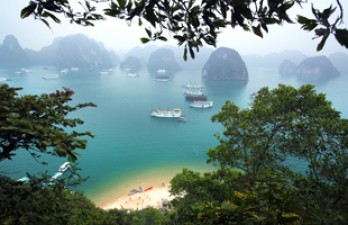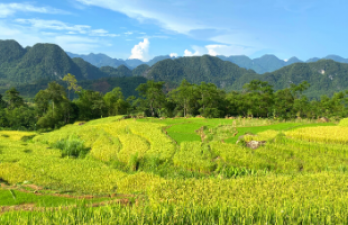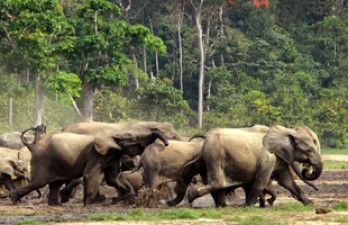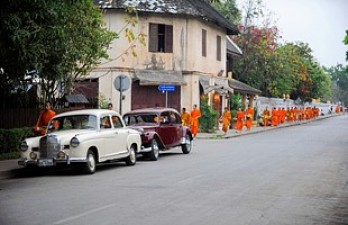SLOW TRAVEL
2THE FUTURE OF TRAVEL IS PRESENT AT HANDSPAN SINCE 1997
Fast-fashion, fast-food, fast-combustion, fast-urbanization, fast travel (aka “a marathon for travel selfies”)… It’s obvious that we live in a fast-moving world that has strongly encouraged the growth of a throw-away society without due regard to the consequences of the waste derived from the excessive production of short-lived or disposable items, over durable or repairable goods. This wasteful attitude has been in most cases exacerbated by the lack of proper education in the basic skills of survival and in what real enjoyment means.
Fortunately, there are always other alternatives that serve as the perfect counterpoint for the above-mentioned subjects, although we can’t wait for instance to see a fast-moving Renewable Energy Industry, which by the way is not moving forward as fast as it could, due to the many challenges that currently needs to face. But that's another topic...
Anyway, there are also other fields that have started to evolve in the correct direction, that’s for example the case of the sustainable clothing or the slow food supporters, who are respectively aiming at a new culture of enjoyment through high-quality and ethical garments and gastronomy, and ultimately, at a change in the clothing and food industry.
It is therefore not surprising that another ‘(p)leisure’ industry like the Travel and Hospitality sector is also gaining more and more consumers and professionals that use and advocate for other ways of travelling that go beyond the package holiday, the mass tourism or the jet set myth. Thanks to the people that demand a vacation with real value, the Slow travel is right now establishing itself as a successful new form of travel.
The Slow travel can be conducted both within the luxury and low-budget segments, in nature, in the cities, privately or in the context of business events. The phenomenon has its roots in the megatrend of individualization, being part of the growing demand for the self-organization of one’s own holiday ideal. Slowing down the pace, choosing quality experiences and really enjoying them, instead of just collecting impressions – all this has to do with a new personal attitude. The change is due to the increasingly widespread feeling that the world is getting faster and that everyday life is becoming more hectic and complex.
In most cases, only a drastic shift would allow us to change our routine. However,  our precious vacation should easily take place in our way, and it’s especially those persons who are more perceptive or feel that they already have rush enough in their daily lives, the ones for whom having time to reset, take a pause, breathe deeply and really enjoy are their most valuable expectations when going on a trip. With good reason, they are slow travel seekers.
our precious vacation should easily take place in our way, and it’s especially those persons who are more perceptive or feel that they already have rush enough in their daily lives, the ones for whom having time to reset, take a pause, breathe deeply and really enjoy are their most valuable expectations when going on a trip. With good reason, they are slow travel seekers.
Redefinition of the “Experience Society”
Although the German term “Erlebnisgesellschaft” is quite more accurate, a good example of Experience Society or Experience Economy can be found in the pioneering book of the Tofflers, Future Shock, first published in 1970. In Chapter 10, The Experience Makers, this futurist couple already explained how an economy was being created gearing to the provision of psychic gratifications because humans will be soon striving for a better "quality of life"; they also talked about how we will be witnessing the raise of experience industries whose sole output consists of pre-programmed experiences, including simulated environments that offer customers a taste of adventure, pleasure, danger and so on.
Heidi and Alvin Toffler were definitely right with their predictions. But who does not like to “experience new things”? Are we humans irresponsible just by the simple fact of being curious or trying to escape from routine? Of course not! Curiosity, just the same as many other attributes, can be a very nice virtue when it drives us to make the right choices. This way, we can be responsibly or irresponsibly curious, responsible or irresponsible experimentalists, responsible or irresponsible travellers, hedonists, adventurers, fashion or food lovers… in a nutshell, depending directly on OUR choices, we can be either responsible consumers who care about HOW the services or products that we are purchasing have been elaborated, or irresponsible consumers who hasn’t even taken a second to think about this –attitude that apart from irresponsible is quite dumb too, since in the end, that “you are what you eat” can also be extrapolated to “you get what you buy”. Luckily, many people have realized this and it’s already many of us saying “Thank you, but I am not interested in your sss…ervices”.
Slow travelling precisely stands for a reassessment of experiences. So what has hitherto distinguished the ideal of modern experiential society -specifically, getting as many attractive new inputs as possible and as many sensory new impressions in the shortest possible time- is no longer valid in such a one-dimensional way. When travelling slowly and mindfully under the perspective “less is more”, while designing OUR free time, we are not necessarily looking for action or adrenalin. It’s much more likely that we are in search of lucidity, transparency, authenticity; in other words, we may be seeking to bring our body and mind into a new focus.
Simultaneously, Slow travel can also mean a form of Adventure travel, since we have largely forgotten how to “switch off”, to focus in just one thing, to experience something thoroughly instead of everything at once. That’s why in this case it is absolutely necessary to guide the guest in the “art of wasting time”.
Expecting huge life changes through Slow travelling would certainly be exaggerated (although we do know several cases!), but it definitely has the potential to heal those wounds caused by hectic routines as well as to broad our horizons. This more conscious form of recreational travel is driven by a keen desire for personal growth that continues after the slow experience. In other words, when practiced with certain periodicity, one of the main purposes of the Slow travel is to noticeably and sustainably enhance the quality of life of the individual.
So when we sometimes meet some of our friends also working in the Vietnamese travel sector and they dared to tell us that at Handspan we are not pioneering new destinations and experiences as we used to do, I usually give them the same answer accompanied by a native picaresque smile that I can't just avoid in certain cases: “Well, we’ve also been busy with other stuff, but that you are not aware of what we do, it doesn’t necessarily mean that we are not doing it” and if we are familiar enough with each other or I consider that they are familiar with an ‘out of the box thinking’, then I also reply their question with another question: “Do you really think that a pioneer in our industry deserves such a title just because of the simple fact that new destinations and experiences are constantly uploaded on their portfolio, as if we were mere bed banks? Yes?! Ôi trời ơi… I think you should go on a slow trip darling! Ah, that you don’t have that on your portfolio? Don’t worry, then just get in touch with our travel consultants at Handspan!”
__logo.png)
__hanoi-water-puppets.jpg)
__angkor-wat-blue-reflections.jpg)
__vientiane-buddha-park-monks.jpg)
__bagan-dhammayazika-dusk.jpg)




